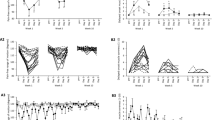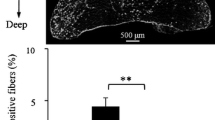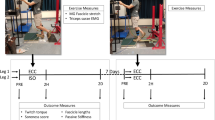Summary
Exercise-induced muscle damage is characterized by histological changes, like Z-line streaming, inflammatory response and decreased muscle function reflected in a prolonged decline in maximal isometric muscle strength after eccentric work. It is assumed that force decrement is mainly related to the amount of structural damage. However, the relationship between number of eccentric contractions, magnitude of structural damage and force decrement is not very well documented. Therefore we studied the effect of an increasing number of both isometric and eccentric (forced lengthening) contractions on histological parameters of muscle damage and maximal isometric force in an experimental in situ rat model. Tibialis anterior muscles of male Wistar rats were subjected to an increasing number of either isometric or eccentric contractions and were examined for histological markers of muscle damage. The present study shows that muscle damage increases progressively with the number of forced lengthening contractions. Maximal isometric torque was found to decline after both types of exercise. However, the decline after forced lengthening exercise was more pronounced. Only a weak relationship between percentage of histological muscle damage and isometric torque after forced lengthening contractions was found. The findings of the present study suggest that the decline in muscle force after eccentric exercise may partly be attributed to other factors than structural damage.
Similar content being viewed by others


References
Abbott B. C., Bigland B. & Ritchie J. M. (1952) The physiological cost of negative work. J. Physiol. 117, 380–90.
Armstrong R. B. (1990) Initial events in exercise-induced muscular injury. Med. Sci. Sports Exerc. 22, 429–35.
Armstrong R. B., Oglivie R. W. & Schwane J. A. (1983) Eccentric exercise induced injury to skeletal muscle. J. Appl. Physiol. 54, 80–93.
Clarkson, Nosaka K. & Braun B. (1992) Muscle function after exercise-induced muscle damage and rapid adaptation. Med. Sci. Sports Exerc. 24, 512–20.
Cleak M. J. & Eston R. G. (1992) Muscle soreness, swelling, stiffness and strength loss after eccentric exercise. Br. J. Sp. Med. 26, 267–72.
Kuipers H., Drukker J., Frederik P. M., Geurten P. & Van Kranenburg G. (1983) Muscle degeneration after exercise in rats. Int. J. Sports Med. 4, 49–55.
Lieber R. L. & Blevins F. T. (1989) Skeletal muscle architecture of the rabbit hindlimb: functional implications of muscle design. J. Morphol. 199, 93–101.
Lieber R. L. & Fridén J. (1993) Muscle damage is not a function of muscle force but active muscle strain. J. Appl. Physiol. 74, 520–6.
Lieber R. L., Woodburn T. M. & Fridén J. (1991) Muscle damage induced by eccentric contractions of 25% strain. J. Appl. Physiol. 70, 2498–507.
Mccully K. K. & Faulkner J. A. (1985) Injury to skeletal muscle fibers of mice following lengthening contractions. J. Appl. Phys. 59, 119–26.
Mccully K. K. & Faulkner J. A. (1986) Characteristics of lengthening contractions associated with injury to skeletal muscle fibers. J. Appl. Phys. 61, 293–9.
Peeze-Binkhorst F. M., Slaaf D. W., Kuipers H., Tangelder G.-J. & Reneman R. S. (1990) Exercise-induced swelling of rat soleus muscle: its relationship with intramuscular pressure. J. Appl. Physiol. 69, 67–73.
Rodenburg J. B., Bär P. R. & De Boer R. W. (1993) Relations between muscle soreness and biochemical and functional outcomes of eccentric exercise. J. App Physiol. 74, 2976–83.
Stauber W. T. (1989) Eccentric action of muscles: physiology, injury, and adaptation. Exerc. Sports Sci. Rev. 17, 157–85.
Van Der Meulen J. H. (1991) Exercise-Induced Muscle Damage: Morphological, Biochemical and Functional Aspects. Maastricht: Rijksuniversiteit Limburg.
Van Der Meulen J. H., Kuipers H., Stassen F. R. M., Keizer H. A. & Van der Vusse G. J. (1992) High energy phosphates and related compounds, glycogen levels and histology in the rat tibialis anterior muscle after forced lengthening and isometric exercise. Pflügers Arch. 420, 354–8.
Van Der Meulen J. H., Kuipers H., Van Der Wal J. C. & Drukker J. (1993) Quantitative and spatial aspects of degenerative changes in rat soleus muscle after exercise of different durations. J. Anat. 182, 349–53.
Warren G. L., Lowe D. A., Hayes D. A., Karwoski C. J., Prior B. M. & Armstrong R. B. (1993) Excitation failure in eccentric contraction-induced injury of mouse soleus muscle. J. Physiol. 468, 487–99.
Warren G. L., Hayes D., Lowe D. A., Williams J. H. & Armstrong R. B. (1994) Eccentric contraction-induced injury in normal and hindlimb-suspended mouse soleus and EDL muscles. J. Appl. Physiol. 77, 1421–30.
Author information
Authors and Affiliations
Rights and permissions
About this article
Cite this article
Hesselink, M.K.C., Kuipers, H., Geurten, P. et al. Structural muscle damage and muscle strength after incremental number of isometric and forced lengthening contractions. J Muscle Res Cell Motil 17, 335–341 (1996). https://doi.org/10.1007/BF00240930
Received:
Revised:
Accepted:
Issue Date:
DOI: https://doi.org/10.1007/BF00240930


